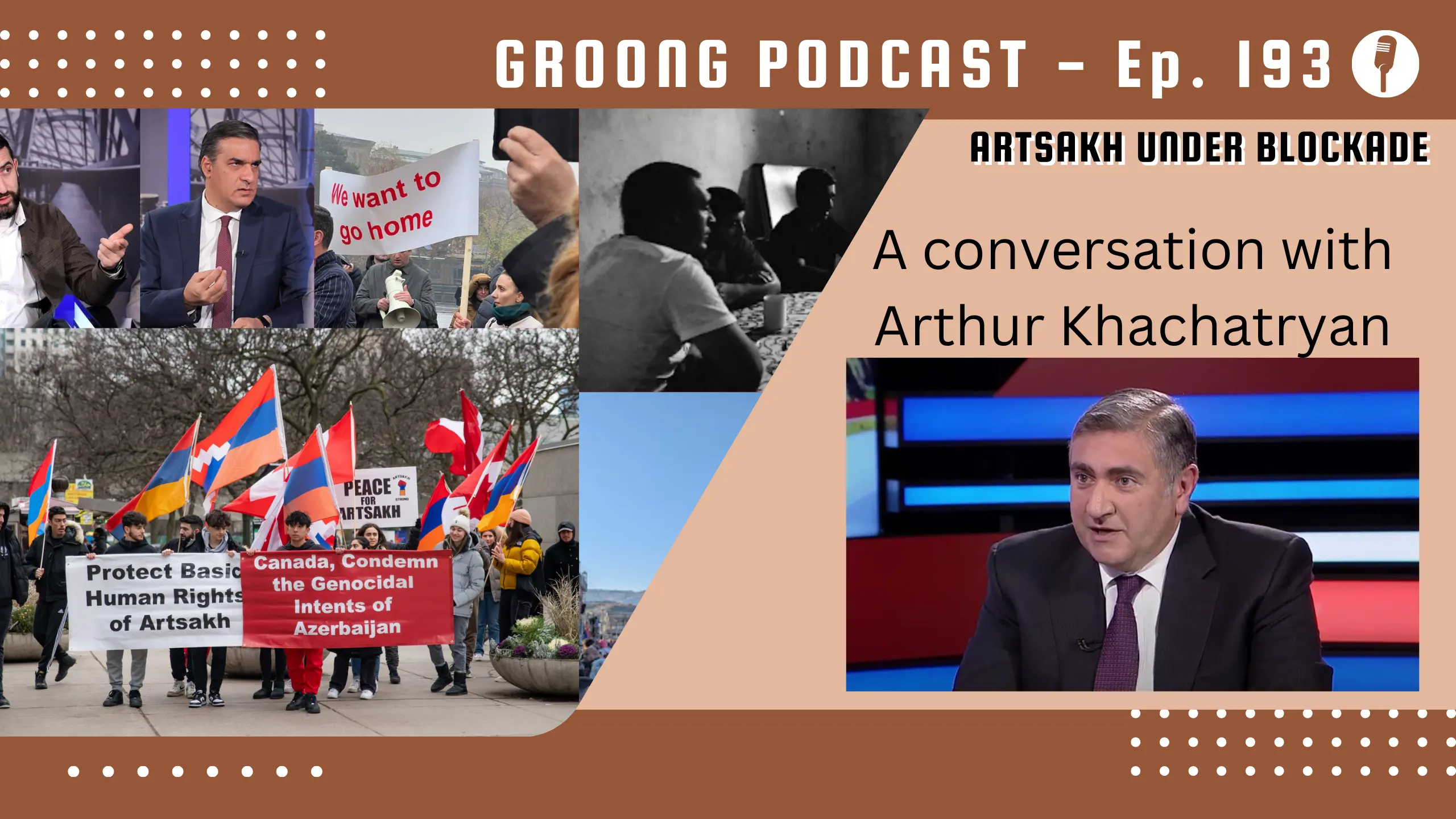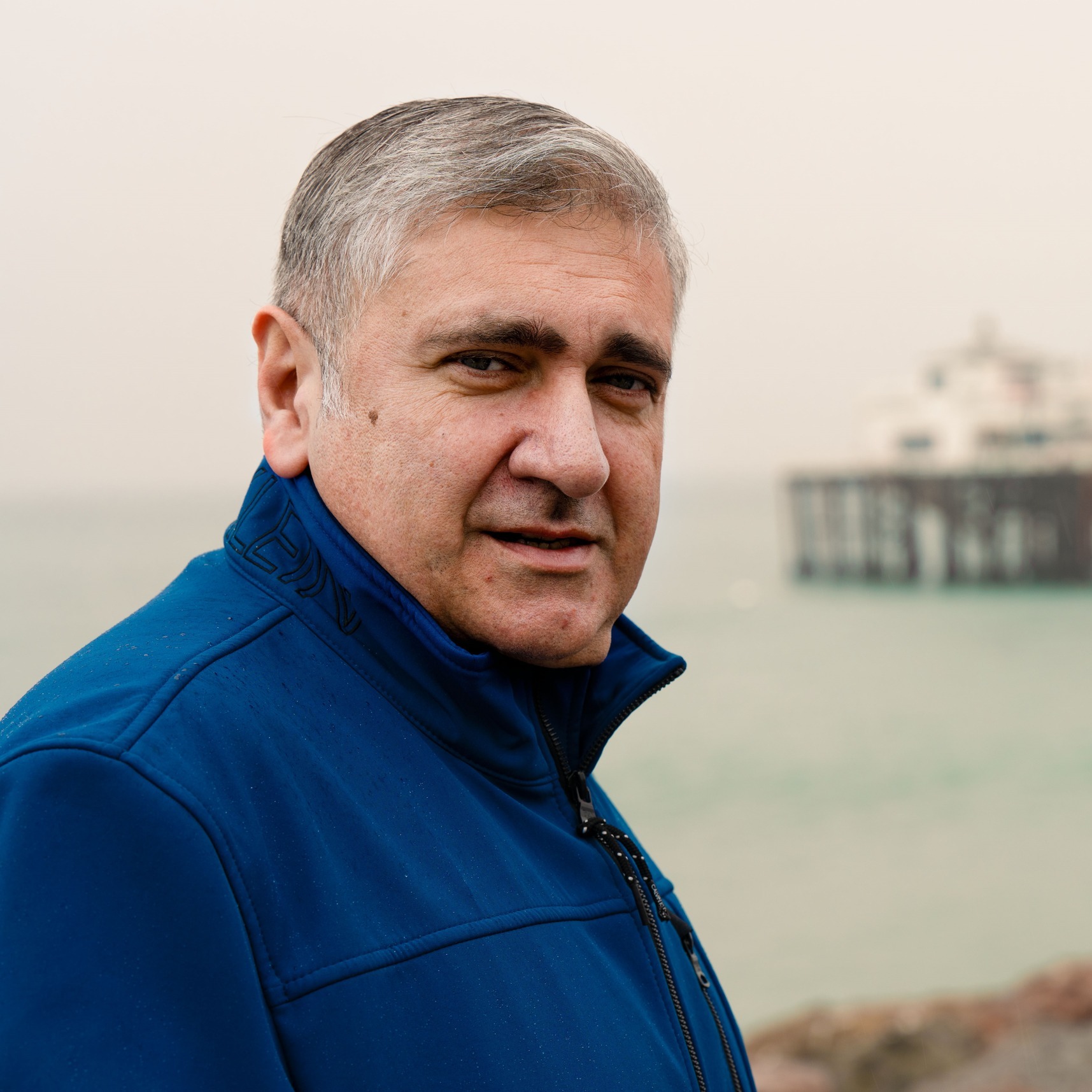
Guest:
- Arthur Khachatryan, an MP from the Hayastan (Armenia) alliance and member of the Armenian Revolutionary Federation (ARF Dashnaktsutyun). In the past, he held government posts such as Deputy Minister of Territorial Administration and Development, Governor of Shirak, and Minister of Agriculture.
“The Armenian authorities are trying to bury the issue of status of Artsakh” -Arthur Khachatryan
Topic:
More than 120,000 people remain trapped in the Republic of Artsakh (or Nagorno-Karabakh) due to Azerbaijan’s blockade of the Lachin corridor, as this crisis enters its 15th day.
This interview is a continuation of the collaboration between Groong and 168 Hours aiming to bring you more English-language coverage on the developments of this very seriou s humanitarian crisis in progress.
Links:
- 168 Hours: https://168.am
- Groong: https://podcasts.groong.org
Episode 193 | Recorded: December 26, 2022
Show Notes
Discussion
Snub to Russia
Let’s begin our discussion with what transpired on Friday the 23rd, in Moscow. The foreign ministers of Armenia, Azerbaijan and Russia were originally scheduled to meet in a trilateral meeting there, and the agenda was about the so-called “peace negotiations” between Azerbaijan and Armenia.
Russian foreign minister Lavrov announced to the media that Ararat Mirzoyan canceled at the last minute, and so only Azerbaijan’s Jeyhun Bayramov and Lavrov met.
Questions:
- What is your take on this apparent snub of Lavrov and Bayramov by Mirzoyan?
- Some argue that it is an indication of newfound independence. Your thoughts?
Role of the Armenian Government
Mostly, the Armenian government has been on a global diplomatic offensive during the Artsakh blockade. Last Monday the UN security council convened at Armenia’s request to discuss the situation in Artsakh. We heard a lot of statements from UNSC members bemoaning the crisis, urging the reopening of the Lachin corridor, but what we didn’t hear was condemnation of Azerbaijan or resolutions by the UNSC mandating remediation.
- Why didn’t Armenia introduce a draft resolution, despite having the right to do so as a party to the discussion?
- Aren’t the 120K technically also citizens of Armenia? What role should the Armenian government be playing in this crisis?
On Saturday, the Foreign Ministry slammed Ilham Aliyev for the statements he made during a meeting with people from so-called “western Azerbaijan”. Our MFA stated:
_“...aggressive actions carried out by Azerbaijan against the people of Nagorno Karabakh are part of the consistent policy of ethnic cleansing of the people of Nagorno Karabakh.”_
Yet despite such statements, Pashinyan’s foreign policy continues to pursue solutions that leave Artsakh inside Azerbaijan. Additionally, Pashinyan’s government exerts pressure on the Armenian parliament to NOT include statements that promote the right of Artsakh to determine its own fate, and consummate its independence.
- Can you help us make sense of Pashinyan’s foreign policy towards Artsakh, and their “era of peace” agenda in general?
- What do you think about “Remedial Secession” which Pashinyan’s team has in the past argued should be Armenia’s strategy? Just this past week Pashinyan’s former FM Zohrab Mnatsakanyan said this is now a necessity.
- What is the international legal basis for Remedial Secession?
Some politicians and analysts, such as Avetik Chalabyan, say that without engaging the military, Armenia will not be able to unblock the corridor. What can Armenia do?
- Does Armenia have the capacity to engage in Military operations?
- Diplomatically speaking, is Recognition of Artsakh a possibility? How would it alter the course of Artsakh’s cause? (Do you support this?)
Role of the Armenian Opposition
Your alliance, the Hayastan (or Armenia) Alliance, and generally the parliamentary opposition has been very publicly critical of how Pashinyan and his team are handling this crisis, and the cause of Artsakh in general.
- At times like this, does internal criticism of Pashinyan weaken the hand of Pashinyan’s government and reduce their latitude in negotiations?
The opposition repeatedly says that a critical requirement to reverse the country’s downhill slide since the disastrous loss in the 44-day war is regime change. The Armenian opposition held rallies in the spring of 2022 trying to unseat Pashinyan. Yet, these efforts were not successful.
- Has the opposition conducted a “lessons learned” to understand what went right, what went wrong, and how to move forward from that movement?
- What were the primary reasons why the opposition failed?
- While regime change was not achieved, some analysts said that the opposition’s movement did alter the course of the negotiations, because Pashinyan had to backtrack on some plans and explain to negotiators and the enemy that regardless of what he would agree to, “the Armenian people” were clearly expressing diverging views on the streets. Can you discuss?
Weekend Rallies in Artsakh
Yesterday, Sunday, there were mass rallies in Artsakh. Tens of thousands attended to demand freedom of movement and reopening of their link with Armenia. The rallies were organized by the government, and state minister Ruben Vardanyan addressed the protestors.
It’s interesting to note how virulently negative Azerbaijan’s leadership and press has been towards Vardanyan. They discuss everything from calling him a Russian puppet, to assassinating him! (of course, nobody holds them accountable for such terroristic public expressions)
- What do you think is being expected from Ruben Vardanyan as the state minister of Artsakh Republic?
- Why is Azerbaijan so rabidly anti-Vardanyan?
Jeyhun Bayramov last week said that Artsakh officials used to be a lot more cooperative before Vardanyan was appointed minister of state.
- What has changed in Artsakh’s approach with Azerbaijan?
- Do you see Artsakh breaking away from Armenia’s foreign policy, in pursuit of its self-determination? How?
Wrap-up
We hope you found our Conversations on Groong helpful, we invite your feedback and your suggestions. You can find us on most social media and podcast platforms. Thanks to Laura Osborn for the music on our podcasts.
Guests

Arthur Khachatryan
Mr. Arthur Khachatryan is an MP from the Hayastan Dashinq (Armenia alliance) and a member of the Armenian Revolutionary Federation (ARF Dashnaktsutyun). In the past, he has held government posts such as Deputy Minister of Territorial Administration and Development, Governor of Shirak, and Minister of Agriculture.
Hosts

Hovik Manucharyan
Hovik Manucharyan is an information security engineer who moved from Seattle to Armenia in 2022. He co-founded the ANN/Groong podcast in 2020 and has been a contributor to Groong News since the late 1990s.
Disclaimer: The views expressed by Hovik Manucharyan on the ANN/Groong podcast are his own and do not necessarily reflect the opinions of his employer or any other organization.